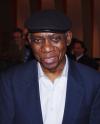Biography
Other info : Career | Furtherreading | Bibliography
In his poetry, Yusef Komunyakaa weaves together the elements of his own life in short lines of vernacular to create complex images of life in his native Louisiana and the jungles of Vietnam. From his humble beginnings as the son of a carpenter, Komunyakaa has traveled far to become a scholar, professor, and prize-winning poet. In 1994, he claimed the Pulitzer Prize and the $50,000 Kingsley Tufts Poetry Award for his Neon Vernacular: New and Selected Poems. "In the pantheon of poet stereotypes—the vitriolic, passionate drunkard is one; the wry, acerbic loner another—Mr. Komunyakaa . . . is more the dreamy intellectual," Bruce Weber notes in the New York Times, "a Wordsworthian type whose worldly, philosophic mind might be stirred by something as homely and personal as a walk in a field of daffodils." Weber continues, "His poems, many of which are built on fiercely autobiographical details—about his stint in Vietnam, about his childhood—deal with the stains that experience leaves on a life, and they are often achingly suggestive without resolution."
In Neon Vernacular: New and Selected Poems, Komunyakaa pulls together all of the most powerful strands of his poetic vision. The images are those of the South and its culture, of blacks living in a white world, of war in Southeast Asia, of cities pulsing to the blues and jazz. The language is simple, laid out in short lines. Diann Blakely Shoaf observed in the Bloomsbury Review, "The short-lined poem, a staple of the Deep Image movement, has seemed stale and tiresome in recent years, as too often it has been shaped by poets who equate the line with a unit of syntax." Yet, the reviewer continues, "Komunyakaa mostly avoids this pitfall, in part because of his sensitive and well-tuned ear, in part because he knows that a short line as well as a long one should possess both content and integrity." Combining his deeply personal images and his seemingly effortless presentation, Komunyakaa crafts a "neon vernacular." As Robyn Selman puts it in a Voice Literary Supplement review, "Most of Yusef Komunyakaa's poems rise to a crescendo, like that moment in songs one or two beats before the bridge, when everything is hooked-up, full-blown."
In Copacetic, Komunyakaa returns "to his boyhood and early manhood," observes Kirkland C. Jones in a Dictionary of Literary Biography profile. "These poems examine folk ideas, beliefs, sayings, and songs, and the terminology of blues and jazz." I Apologize for the Eyes in My Head takes the poet and his reader "from lost love in the city to loved ones and friends lost to the evils of slavery and Jim Crowism in the Deep South," adds Jones. In these poems, "Komunyakaa continues his fascination with ghosts reflected in life's looking glasses, with images of skeletons, and with other symbols of mortality and life's fragility."Komunyakaa shows us racism revealing itself in the most ordinary ways," Booklist reviewer Pat Monaghan writes of Magic City, "the connections between people and their land, sex finding beautiful expression in hard times."
In the late 1960s, Komunyakaa served as a correspondent for Army publications in Vietnam. Although he uses images from this experience in many of his works, the poet deals directly with the war in his collection Dien Cai Dau. The title means "crazy" in Vietnamese and was used by locals to refer to American soldiers fighting in their country. In the opinion of Kirkland C. Jones, "Komunyakaa's Vietnam poems rank with the best on that subject. He focuses on the mental horrors of war—the anguish shared by the soldiers, those left at home to keep watch, and other observers, participants, objectors, who are all part of the 'psychological terrain.'" The poems in this volume also explore issues of race and sex: "Komunyakaa writes sensitively about the difficulties of being a black American soldier fighting alongside white men," observes Wayne Koestenbaum in the New York Times Book Review, "and of American servicemen's sexual relations with Vietnamese women."
In these poems of Vietnam, Komunyakaa uses his characteristic style to tangle together the natural and the man-made, the Southeast Asian landscape and the war. In the words of Bloomsbury Review contributor Samuel Maio, "Komunyakaa, through his simple and vernacular diction, his evocative images and chronicled experiences, successfully provides us with glimpses into the mind of a dien cai dau, often quite aptly named, the insanity of Vietnam measuring against (and similarly affecting) its principles, as these terrifying poems—drawn by the precise hand of an unerring craftsman—make so strikingly clear." Koestenbaum remarks that the poet's casual juxtaposition of nature and war belie the artistry at work. "Though his tersely-phrased chronicles, like documentary photographs, give us the illusion that we are facing unmediated reality, they rely on a predictable though powerful set of literary conventions." He adds, "The book works through accretion, not argument; the poems are all in the present tense, which furthers the illusion that we are receiving tokens of a reality untroubled by language."






